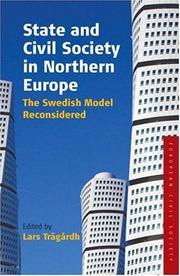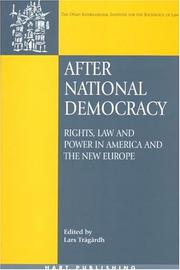| Listing 1 - 10 of 10 |
Sort by
|

ISBN: 1845451872 9781845451875 1845452321 9781845452322 1782382003 Year: 2007 Publisher: New York, NY Berghahn Books
Abstract | Keywords | Export | Availability | Bookmark
 Loading...
Loading...Choose an application
- Reference Manager
- EndNote
- RefWorks (Direct export to RefWorks)
In the current neo-liberal political and economic climate, it is often suggested that a large and strong state stands in opposition to an autonomous and vibrant civil society. However, the simultaneous presence in Sweden of both a famously large public sector and an unusually vital civil society poses an interesting and important theoretical challenge to these views with serious political and policy implications. Studies show that in a comparative context Sweden scores very highly when it comes to the strength and vitality of its civil society as well as social capital, as measured in terms of trust, lack of corruption, and membership of voluntary associations. The “Swedish Model,” therefore, offers important insights into the dynamics of state and civil society relations, which go against current trends of undermining the importance of the welfare state, and presents autonomous civic participation as the only way forward.
Civil society --- Social capital (Sociology) --- Democracy --- Capital, Social (Sociology) --- Sociology --- Social contract

ISBN: 1841133299 Year: 2004 Publisher: Oxford : Hart,
Abstract | Keywords | Export | Availability | Bookmark
 Loading...
Loading...Choose an application
- Reference Manager
- EndNote
- RefWorks (Direct export to RefWorks)
Constitutional history --- Democracy --- Legitimacy of governments --- Nation-state.

ISBN: 1841133280 Year: 2004 Publisher: Oxford Hart
Abstract | Keywords | Export | Availability | Bookmark
 Loading...
Loading...Choose an application
- Reference Manager
- EndNote
- RefWorks (Direct export to RefWorks)
Book
ISBN: 9780295750552 9780295750569 9780295750545 Year: 2022 Publisher: Seattle, Wash. University of Washington Press
Abstract | Keywords | Export | Availability | Bookmark
 Loading...
Loading...Choose an application
- Reference Manager
- EndNote
- RefWorks (Direct export to RefWorks)
Sociology of culture --- Political sociology --- Social policy --- Sweden
Book
ISBN: 9789113068817 Year: 2024 Publisher: Stockholm Norstedts
Abstract | Keywords | Export | Availability | Bookmark
 Loading...
Loading...Choose an application
- Reference Manager
- EndNote
- RefWorks (Direct export to RefWorks)
Sociology of culture --- Political sociology --- Social policy --- Sweden
Book
ISBN: 9780857457561 9781782381495 Year: 2013 Publisher: New York Berghahn
Abstract | Keywords | Export | Availability | Bookmark
 Loading...
Loading...Choose an application
- Reference Manager
- EndNote
- RefWorks (Direct export to RefWorks)
Civil society --- Civil society --- History
Book

ISBN: 9781782382003 Year: 2007 Publisher: New York Oxford
Abstract | Keywords | Export | Availability | Bookmark
 Loading...
Loading...Choose an application
- Reference Manager
- EndNote
- RefWorks (Direct export to RefWorks)
Digital

ISBN: 9781782382003 Year: 2007 Publisher: New York; ; Oxford Berghahn Books
Abstract | Keywords | Export | Availability | Bookmark
 Loading...
Loading...Choose an application
- Reference Manager
- EndNote
- RefWorks (Direct export to RefWorks)
Book

ISBN: 1789209838 9781789209839 Year: 2018 Publisher: New York; Oxford : : Berghahn Books,
Abstract | Keywords | Export | Availability | Bookmark
 Loading...
Loading...Choose an application
- Reference Manager
- EndNote
- RefWorks (Direct export to RefWorks)
Notwithstanding its many successes since 1945, the project of European integration currently faces major difficulties, from financial crises and mass immigration to the impending departure of the UK from the European Union. At the same time, these challenges have spurred civil society organizations within and across Europe, revealing a shared public sphere in which citizens can mobilize around refugee rights, opposition to austerity policies, and other issues. Europeanization in Sweden assembles new empirical research on how these processes have played out in one of the continent's wealthiest nations, providing insights into whether, and how, the "Swedish model" can guide European integration.
Digital

ISBN: 9780857457578 Year: 2013 Publisher: New York; ; Oxford Berghahn Books
Abstract | Keywords | Export | Availability | Bookmark
 Loading...
Loading...Choose an application
- Reference Manager
- EndNote
- RefWorks (Direct export to RefWorks)
| Listing 1 - 10 of 10 |
Sort by
|

 Search
Search Feedback
Feedback About UniCat
About UniCat  Help
Help News
News